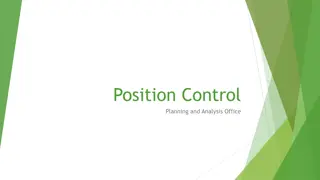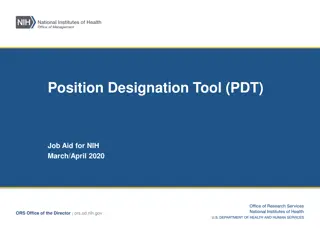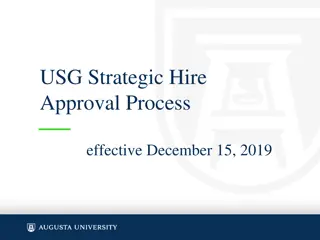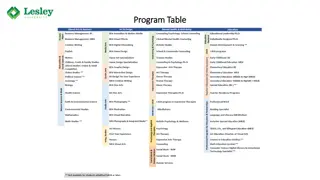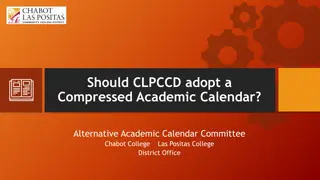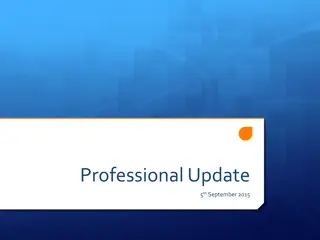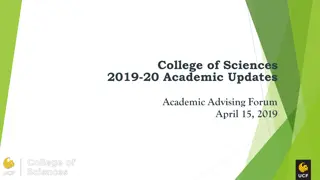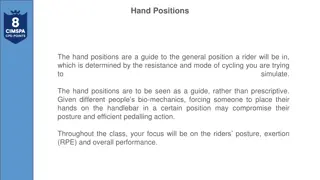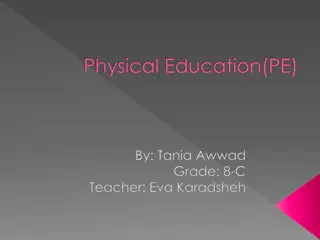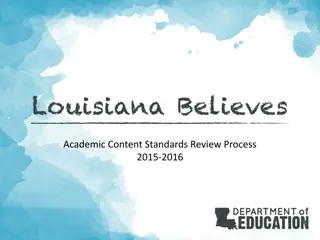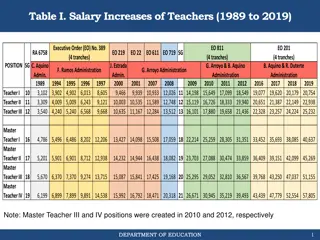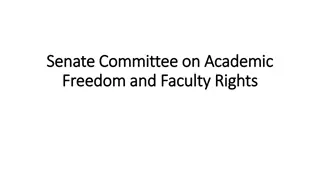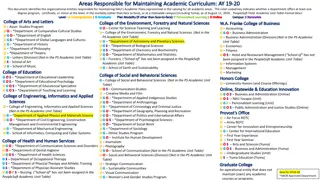Academic Professional Positions Review 2019: SUCSS Changes
Recent changes to the State University Civil Service System (SUCSS) procedures require public universities in Illinois to review positions designated as Principal Administrative Appointments (Academic Professionals at UIS) to determine Civil Service exemption eligibility. This session covers new requirements, conversion procedures, benefits impact, civil service classifications, and more.
Download Presentation

Please find below an Image/Link to download the presentation.
The content on the website is provided AS IS for your information and personal use only. It may not be sold, licensed, or shared on other websites without obtaining consent from the author. Download presentation by click this link. If you encounter any issues during the download, it is possible that the publisher has removed the file from their server.
E N D
Presentation Transcript
Open Forum Campus Wide Review of Academic Professional Positions 2019 Presented by the Office of Human Resources
Academic Professional versus Civil Service conversion Recent changes to the State University Civil Service System (SUCSS) procedures require all public universities in Illinois to review positions designated as Principal Administrative Appointments (known as Academic Professionals at UIS) to determine whether the job duties meet the requirements to be exempt from the Civil Service System. SUCSS now requires conversion of positions to Civil Service if the requirements are not met.
Topics to be addressed in this session include: New requirements for positions designated as AP Timeline for review of UIS positions Conversion procedures and the impact on benefits and working conditions New or revised civil service classifications created by SUCSS Calculation of seniority within Civil Service classifications Q & A
Important Resources What is the Civil Service statute? State Universities Civil Service Act What is SUCSS? State Universities Civil Service System What is the Merit Board? The governing body of the Civil Service System Where are the new SUCCS procedures/definitions located? Procedure Manual
Civil Service exemption According to the civil service statute, SUCSS and the Merit Board: The basic statutory foundation for all employees in the University System is that they are assumed civil service unless exempted by the Act.
Civil Service exemptions to qualify as Academic Professional Under Section 36(e) of the State Universities Civil Service Act, all positions at a public university in Illinois shall be Civil Service except: 1. The members and officers of the Merit Board and the board of trustees, and the commissioners of the institutions and agencies covered hereunder; 2. The presidents and vice-presidents of each educational institution; 3. Other principal administrative employees of each institution and agency as determined by the Merit Board; 4. The teaching, research, and extension faculties of each institution and agency; 5. Students employed under rules prescribed by the Merit Board, without examination or certification.
Enforcement Traditional SUCSS Enforcement: Biennial Audits Improperly designated positions were expected to be converted when vacated by the incumbent New process adopted by SUCSS October 1, 2018: Biennial Audits Conversion of positions found to be improperly exempted from Civil Service within 16 months of audit findings
New Definition applicable to Academic Professionals a. Principal Administrative Appointments (PAA) may be exempt pursuant to section 36e(3) of the Act, whose primary duties constitute senior management or senior administrative functions for an entire university, campus, agency, administrative/business department/unit, or academic department/unit. If the position does not fit within the general scope, duties, or function of an existing civil service classification, the following criteria may be considered in determining whether the primary duties constitute senior management or senior administrative functions: 1. Whether and to what extent the position has the authority to represent and obligate the university, campus, agency, or department/unit in matters of significance; 2. Exemption as an executive or administrative employee according to the Fair Labor Standards Act, [29 USC 213(A)(1)] duties test is necessary, but not alone sufficient to qualify for exemption under section 36e(3) of the Act. Source: SUCSS Procedure Manual: Exemption Procedures Section 2.2 Principal Administrative Appointments
New definition continued: b. Notwithstanding the above criteria, specific positions exempted under section 36e(3) of the Act include: 1. The chancellor of each educational institution; 2. The provost, vice provost or vice chancellors, associate and assistant chancellors, associate and assistant vice presidents, associate and assistant provosts, associate and assistant vice provosts, associate and assistant vice chancellors of each educational institution; 3. The Executive Officer/Executive Director of the Illinois Community College Board, the Illinois Student Assistance Commission, the State Universities Retirement System, the Illinois Board of Higher Education, and the State Universities Civil Service System; 4. Executive Director positions at each educational institution and agency; 5. Positions that are professionally licensed/certified to practice within their respective fields and whose primary duties constitute the practice of that field who also possess a requisite degree within the field of study such as a MD, JD and MSW. Examples of these positions include: physicians, veterinarians, dentists, pharmacists, licensed advanced practice providers, audiologists, genetics counselors, attorneys, engineers and architects. NOTE: other licensed/certified positions such as veterinary technicians, registered nurses, credentialed nursing assistants, lab technicians and other similar positions are not intended to be exempt from section 36e(3) of the Act. Executive policy advisors for each position identified in (a)(2) above and (b)(1) and (b)(2) above; Positions whose primary duties constitute fundraising, advancement or development work for the institution. Source: SUCSS Procedure Manual: Exemption Procedures Section 2.2 Principal Administrative Appointments 6. 7.
Additional exemptions: a. In accordance with section 36e of the Act, all positions are designated civil service, except for the following positions specified in section 36e(4) of the Act: 1. All faculty positions as determined by each university s own internal processes. 2. Teaching positions include those whose primary function is to instruct or counsel students of the institution or its laboratory schools, most specifically related to the normal academic curricula. A. Positions with the primary duty of teaching, tutoring, instructing or lecturing in the activity of imparting knowledge, whether in the classroom, field, clinical, online or other similar forms of teaching. These teachers include regular academic teachers; teachers of kindergarten or nursery school pupils; teachers of gifted or disabled children; teachers of skilled and semi-skilled trades and occupations; teachers engaged in automobile driving instruction; aircraft flight instructors; home economics teachers; and vocal and instrumental music instructors; and athletic coaches or trainers. This excludes positions for which the primary duty is the teaching or training of other employees of the university or agency. B. Exemption pursuant to this subsection does not require that the position be a tenured or tenure-track position. These positions have traditionally been referred to as adjunct or extension, professor, teacher or instructor. C. Academic advising when that position is granted formal authority by an academic unit (university, college, school, or department) to approve the student's academic program of study and assist the student in progressing toward the appropriate degree. D. Positions for which the primary duty is recruiting students. E. Residence hall directors. F. Deans, assistant deans, associate deans or other positions with primary administrative or supervisory responsibility for faculty exempt positions within a single department or program shall be exempt as teaching or extension faculty, respectively. Source: SUCSS Procedure Manual: Exemption Procedures Section 2.3 Teaching, Research and Extension Faculty Appointments
Additional exemptions continued: b. Research positions primarily engaged in research activities, normally under the direct oversight of an academic department or college and are frequently funded by outside sources. Research in this context is not necessarily limited to the laboratory work typical of the physical sciences, but may also include field historical research, linguistic studies, archaeology, etc. Academic rank is not a prerequisite to inclusion of a particular position in this category. Likewise, those positions with primary administrative or supervisory responsibility for a group of employees falling within this category are considered exempt in accordance with this standard. c. Extension faculty positions as determined by each university s own internal processes include instructional positions created to provide both credit and non-credit instructional programs offered by the institution, which typically do not lead to a degree. 1. The non-credit component includes instructional programs, including but not limited to Early Childhood Education, Adult Education, Continuing Education, and English as a second language. 2. Positions within this exemption category may be employed solely for the duration of the specific course(s) being offered, based on professional experience in a particular profession or industry, or may be subject- matter experts who are employed as regular academic staff members at another educational institution. 3. A position with primary administrative or supervisory responsibility for a group of exempt extension faculty positions within a single department or program shall be exempt as extension faculty. Source: SUCSS Procedure Manual: Exemption Procedures Section 2.3 Teaching, Research and Extension Faculty Appointments
SUCSS Audit Schedule SUCSS is scheduled to audit UIS in February of 2020. Note that this date is subject to change by SUCSS.
SUCSS Audit Findings a. Final Outcome The University System and the employer will engage in an interactive process to work through any disputed positions and will attempt to agree on a resolution prior to the final audit report being issued by the University System. Nothing in an employment contract can prohibit the conversion of a position/employee based on the below detailed remedy and process. Parties in Agreement If the University System and the employer are in agreement that a position was improperly exempted, the employer will have the choice to convert the position/incumbent to the appropriate civil service classification: 1. Immediately upon agreement with the employee, or 2. When the current contract ends, which includes any institutional notice of non-reappointment period, or 3. By the end of the fiscal or academic year or similar timeframe, or 4. If the position becomes vacant. NOTE: A position/incumbent must be converted within a maximum of 16 months from the University System's decision that the position should be designated as civil service. Source: SUCSS Procedure Manual: Exemption Procedures Section 3.3. Accountability for Exemption Authorization b.
Right to appeal SUCSS audit findings Universities have the right to file an appeal with the Merit Board if they disagree with an audit finding 16 month time frame is running DURING the appeal Decision of the Merit Board is final
University-wide review of Academic Professional positions New Procedures also impose a duty on the universities to review (and convert if necessary) all AP positions every 3 years As a means of helping ensure the maintenance of position changes, the University System employers shall establish and implement a cyclic review program wherein position descriptions for all exempt positions are reviewed by the employer for currency of job content and title no less often than once every three years. Exemption status changes discovered as a result of this review shall promptly be corrected and reported to the University System. Source: SUCSS Procedure Manual: Exemption Procedures Section 3.3. Accountability for Exemption Authorization
University-wide review continued Upon review by the employer if a position(s) meets the criteria of civil service employment, the employer will have the choice to convert the position/incumbent to the appropriate civil service classification: 1. Immediately upon agreement with the employee, or 2. When the current contract ends, which includes any institutional notice of non- reappointment period, or 3. By the end of the fiscal or academic year or similar timeframe, or 4. If the position becomes vacant. NOTE: A position/incumbent must be converted within a maximum of 16 months from the University System's decision that the position should be designated as civil service. Source: SUCSS Procedure Manual: Exemption Procedure Section 3.3. Accountability for Exemption Authorization
UIS AP Position Review Plan HR will review one division each year to meet the SUCSS requirement of reviewing all AP positions every three years. Schedule of review will be as follows, but is subject to change based on the progress of the review: Chancellor s Division: June October of 2019 Student Affairs: October 2019 September 2020 Academic Affairs: October 2020- September 2021 A case by case review of all requests to fill vacancies will be ongoing.
UIS AP Position Review Plan, continued (2/3) After HR has performed its review, the findings as a whole will be presented to the Division Head (DH). The DH will then have 30 days to review the findings and respond. There may be a follow-up meeting with the DH, HR Senior Director, and Class/Comp Manager to discuss any concerns.
UIS AP Position Review Plan, continued (3/3) Employees that are to be converted will experience no loss of salary or benefits that have already been accrued. Benefit accrual going forward will be as provided for in the Policy and Rules for Civil Service Employees in the assigned classification. Seniority will be calculated by HR and established for the employee.
Seniority in Civil Service Title Seniority is accrued from the date that it can reasonably be determined that the position description met the criteria (duties/responsibilities) of a civil service classification. This date can be determined based upon a historical evaluation of the job description for the position. In cases where there has been no significant change in the job description, seniority is accrued from the date of employment into the exempt position. Upon change to the civil service position, the employee will also begin accruing benefits no less than those prescribed in the Merit Board Policy Relating to Employee Benefits. Source: SUCSS Procedure Manual: Exemption Procedure Section 5.2 Changing an Exempt Position to a Civil Service Position
Seniority continued: It is possible that an individual in a newly converted position will have more seniority than existing civil service employees in that same classification. Seniority is utilized to determine bumping rights in the event of a Civil Service layoff.
Voluntary Conversions? Voluntary conversions will be allowed if in the best interest of the University, and as long as HR determines the duties warrant the change. All potential conversions will be reviewed by HR in the order of the established schedule unless special circumstances exist.
Probationary Period in Civil Service Position The incumbent will be required to complete a probationary period associated with the designated civil service classification/position. Time served in the previous exempt position will count towards the completion of the probationary period. Some specific examples follow: Example 1: An employee was hired in an exempt position and has served 4 months in the position. It is determined that the position should be a civil service classification of Human Resource Associate which has a 12-month probationary period. Upon changing the position from exempt status to civil service, the employee would be required to complete the 'remaining' 8 months of the 12-month probationary period. Example 2: An employee was hired in an exempt position and has served 14 months in the position. It is determined that the position should be a civil service classification of Human Resource Associate which has a 12-month probationary period. Upon converting the position from exempt status to civil service, the employee would not be required to complete any additional probationary period. Source: SUCSS Procedure Manual: Exemption Procedure Section 5.2 Changing an Exempt Position to Civil Service Position
Potential Remedial Action Upon the recommendation of the Executive Director of the University System, or upon its own initiative, the Merit Board may take any necessary corrective or remedial action in an attempt to resolve incorrect exemption authorization issues. Such corrective or remedial action may take any specific form, as determined by the Merit Board, and will be based on the pattern of severity and history of the noncompliance issue(s). However, no remedial action will be taken that will result in interference with an employment contract, per notice rights as stated in Section 3/3(b) and (e) of the Exemption Procedures Manual. Source: SUCSS Procedure Manual: Exemption Procedure Section 3.4 Remedial Process
Civil Service Myths: Myth: All Civil Service employees earn overtime. Fact: Civil Service classifications that are exempt from the Fair Labor Standards Act (FLSA) are not entitled to earn overtime. HR anticipates that if an AP position must be converted to Civil Service, it will most likely be converted to an FLSA exempt classification. Myth:I can t recruit or hire an out-of-state applicant for a Civil Service position. Fact: For classifications within the professional (01), semi-professional (02), or managerial (03) occupational areas, out-of-state residents may be admitted to examination and equally considered.
Differences between AP and Civil Service Academic Professional Civil Service Exempt Salary SAME SAME Work Week Hours 40 hours 37.5 hours Pay Cycle Monthly Biweekly Vacation Days 24 days 0-3 years = 25 days 3-6 years = 26 days 6-9 years = 27 days 9+ years= 28 days Max Vacation Accruals 72 days, w/ 48 days max at 8/15 2 X your yearly accrual Sick Days 12 Cumulative 13 Days Non-cumulative 12 Cumulative Sick Leave Max Accrual No max No max Leave Reporting Full and half day increments Leave time allowed to be used prior to accrual Full and half day increments Leave time available upon accrual Vacation and Sick Leave Reporting Tool AVSL Web Time Entry Employee Rights Notification Rights Bumping Rights Vacation Pay Out at Separation/Retirement 384 hours 420 hours Annual Increases At academic year (8/16) Around academic year, at the beginning of a biweekly pay period (if authorized by campus salary program) Union representation N/A Possibly depending on classification Retirement Same options Same options Employee Tuition Waivers Available for University of Illinois System schools only Chicago State University, Eastern Illinois University, Governors State University, Illinois State University, Northeastern Illinois University, Northern Illinois University, Southern Illinois University, University of Illinois System Schools, Western Illinois University
Sample Communication to Employee Subject to Conversion As Academic Professional Employee $45,675.00 Monthly 3/16/19 receive last AP paycheck which covers 2/16/19 -3/15/19 As a Civil Service Employee Conversion from AP to Civil Service Employee: Jane Doe UIN: 677777777 Conversion Effective Date: March 16, 2019 Pay Rate Pay Frequency Next Anticipated Pay Date $45,675.00 Biweekly 4/3/19 which covers 3/16/19 -3/23/29 Thereafter, regular pay bi-weekly periods. Vacation Balance (as of March 16, 2019) 236 Hours 221.25 Hours 29.5 Days 29.5 Days Sick Balance (as of March 16, 2019) 200 Hours 187.50 Hours 25 Days 25 Days Health Insurance Benefits Health Insurance Benefits are the same for Civil Service and Academics Professional employees. Retirement (SURS) Retirement Benefits are the same for Civil Service and Academics Professional employees. Employment Exams/Testing N/A Not required for conversion. It is presumed that you qualify for the Civil Service position. Seniority Date N/A Will be determined and communicated to you. Union Status N/A Depends on Classification
New Civil Service Classifications SUCSS is in the process of updating existing and creating new Civil Service Classifications. For more information, please see the SUCSS Classification Plan Update
Question & Answer Q & A
Additional Questions? For questions on the new SUCSS procedures and/or the University- wide review of AP positions, please contact: Melisa Hatch Mark Owens (217)206-7015 (217)206-7096 mhatc2@uis.edu mowen1@uis.edu For questions on the difference in benefits between AP and CS, please contact: Melanie Trimm (217)206-7078 mismit2@uis.edu


